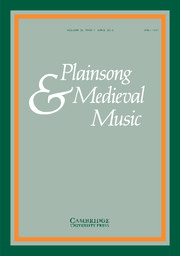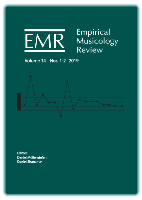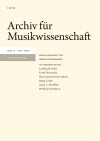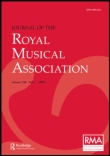
Plainsong & Medieval Music
metrics 2024
Connecting Scholars to the Heartbeat of Medieval Music
Introduction
Plainsong & Medieval Music is a prestigious journal dedicated to the study of early music, particularly plainsong and its cultural contexts, published by Cambridge University Press. Established in 1992, this journal has become a vital resource for scholars in the field of musicology, offering a platform for the dissemination of high-quality research. With an impressive Q1 ranking in the Music category for 2023, it is recognized for its significant contribution to the academic discourse surrounding medieval music traditions. While the journal does not currently offer Open Access options, its rich content, ranging from peer-reviewed articles to critical reviews, remains accessible to researchers, professionals, and students eager to deepen their understanding of this nuanced area. Residing in Cambridge, England, the journal continues to embrace innovative research methodologies, ensuring it remains at the forefront of the evolving landscape of music studies.
Metrics 2024
 0.24
0.24 0.50
0.50 0.50
0.50 10
10Metrics History
Rank 2024
Scopus
JCI (Web Of Science)
Quartile History
Similar Journals

Revista de Musicologia
Advancing the Discourse in Music StudiesRevista de Musicologia is a distinguished academic journal dedicated to the exploration and analysis of musicology, published by the SOC ESPANOLA MUSICOLOGIA. Based in Spain, this journal serves as a vital platform for music scholars, researchers, and enthusiasts to share innovative insights and original research concerning various aspects of music, including historical studies, ethnomusicology, and contemporary critiques. With its ISSN 0210-1459 and a current Scopus ranking placing it in the Q3 quartile of Music studies, the journal reflects a commitment to enhancing the discourse in this rich field. Although it currently does not publish under an open-access model, it continuously aims to provide a rigorous peer-reviewed environment for contributions that engage both academic inquiry and practical applications within musicology. The Revista de Musicologia is thus an essential resource for anyone in the field looking to expand their understanding and expertise in music studies from 2016 through 2024 and beyond.

RIVISTA ITALIANA DI MUSICOLOGIA
Celebrating the Art and Science of Music StudiesRIVISTA ITALIANA DI MUSICOLOGIA, published by the Italian Society of Musicology, is a distinguished journal dedicated to the field of musicology, offering a platform for scholarly research and discourse on a wide array of musical topics. With an ISSN of 0035-6867 and an E-ISSN of 2036-5586, this journal has contributed significantly to the understanding of music in cultural and historical contexts. Although the scope of coverage was marked from 2003 to 2008 in renowned databases like Scopus, the journal continues to serve as an invaluable resource for researchers, educators, and students embroiled in music studies. Its emphasis on rigorous research and critical analysis makes it a vital asset for anyone seeking to deepen their knowledge of musicological inquiry. While not an open-access publication, the RIVISTA ITALIANA DI MUSICOLOGIA remains a prestigious outlet for scholarly contributions that reach audiences eager to explore the complexities of musical heritage.

Empirical Musicology Review
Fostering Innovative Dialogues in Music Through Empirical EvidenceEmpirical Musicology Review is a pioneering journal in the field of musicology, published by the Ohio State University School of Music. Established as an open access journal since 2006, it aims to foster interdisciplinary research by providing a platform for scholars to disseminate empirical studies and analyses related to music. With ISSN 1559-5749, this journal plays a crucial role in expanding the understanding of music through methodological rigor and innovative practices, catering to researchers, professionals, and students alike. By promoting the accessibility of high-quality research, Empirical Musicology Review significantly contributes to the evolving landscape of music studies and enhances the global dialogue surrounding music's theoretical and practical dimensions. The journal's commitment to open access ensures that its valuable insights reach a broad audience, encouraging further exploration and collaboration within the musicology community.

MUSIK UND KIRCHE
Unveiling the Spiritual Dimensions of MusicMUSIK UND KIRCHE is a distinguished journal published by BARENREITER-VERLAG that offers a scholarly platform for the exploration of the intersections between music and ecclesiastical contexts. With an ISSN of 0027-4771 and an E-ISSN of 2568-3128, this journal is particularly valuable for researchers, practitioners, and students engaged in musicology, religious studies, and cultural history. Although currently not open access, it provides a wealth of peer-reviewed articles that enhance understanding of music's role within church tradition and practice, thereby contributing significantly to the field. Despite fluctuating visibility in academic rankings—standing in Q4 of the 2023 category for Music, based on Scopus evaluations—its historical coverage from 2002 to 2012 and resumed publication since 2020 demonstrates its commitment to fostering rigorous academic discourse. The journal is based in Kassel, Germany, and serves as an essential resource for anyone interested in the dynamic relationship between music and spiritual life.

Musicologist
Illuminating the Art and Science of MusicMusicologist is a premier academic journal dedicated to the exploration and analysis of music theory, history, and practice, published by the esteemed Trabzon University State Conservatory in Turkey. With an ISSN of 2618-5652, this journal has been a vital platform for scholars since its inception in 2019, reflecting a commitment to fostering innovative research in the field of music. Recognized for its quality, the journal currently holds a Q2 ranking in the music category for 2023, placing it within the top segments of its discipline, as evidenced by its position at #72 out of 180 in the Scopus rankings, representing the 60th percentile. Although the journal employs a traditional publication model, it serves as a crucial repository for contemporary musicological discourse, aiming to advance knowledge and understanding within a vibrant academic community. Musicologist is not only a resource for seasoned researchers but also an invaluable tool for students and professionals alike, nurturing a comprehensive appreciation of music as an art form and scholarly pursuit.

ARCHIV FUR MUSIKWISSENSCHAFT
Bridging Tradition and Modernity in MusicologyARCHIV FUR MUSIKWISSENSCHAFT, the esteemed journal published by FRANZ STEINER VERLAG GMBH, serves as a significant platform for the dissemination of scholarly research in the field of musicology. With an ISSN of 0003-9292 and an established history of publication reaching back to 2002, this journal aims to explore various aspects of music theory, history, and ethnomusicology, contributing to academic discourse within a vibrant global community. Despite its designation in the Q4 category for music in 2023, the journal continues to foster innovative research and discussions among budding musicians, established academics, and music enthusiasts alike. While Open Access options are not currently available, the journal's offerings are enriched by a thorough review process aimed at maintaining high academic standards. Located in Stuttgart, Germany, at BIRKENWALDSTRASSE 44, D-70191, ARCHIV FUR MUSIKWISSENSCHAFT is committed to engaging its readers through insightful articles and reveals the evolving landscape of music scholarship while remaining a resourceful tool for researchers and students pursuing knowledge in this captivating field.

MUSICAL TIMES
Navigating the Rich Tapestry of Musical DiscourseMUSICAL TIMES is a distinguished journal dedicated to the exploration and dissemination of scholarly works in the realm of music, serving as an essential resource for researchers, professionals, and students alike. Published by MUSICAL TIMES PUBLICATIONS LTD, this journal has built a robust reputation within the arts and humanities, specifically focusing on music studies, with an impactful reach indicated by its Scopus ranking at #73 out of 106 in the field. Though access to this journal is not open, its curated content, which spans various facets of musicology and contemporary music discourse, enriches the academic community by encouraging insightful discussions and critical analyses. With its historical roots tracing back to its inception, MUSICAL TIMES aims to foster a deeper understanding of music's cultural, social, and artistic dimensions, making it a valued publication for those engaged in the scholarly pursuit of music.

JOURNAL OF THE ROYAL MUSICAL ASSOCIATION
Exploring the depths of musical innovation.JOURNAL OF THE ROYAL MUSICAL ASSOCIATION, published by Cambridge University Press, stands as a significant repository for innovative research and scholarly discourse within the field of music studies. Recognized for its contributions to the understanding of musical practices, theory, and history, this esteemed journal offers a platform for academics and researchers to disseminate their findings to a broad audience. With an ISSN of 0269-0403 and E-ISSN of 1471-6933, the journal has maintained a notable presence since its inception, merging insights from both traditional and contemporary musicology. It currently occupies a Q4 ranking in Music within the Scopus database, reflecting its inclusion within the arts and humanities landscape. While the journal traditionally operates under subscription access, its continuing commitment to advancing music scholarship ensures that it remains an essential resource for students, scholars, and practitioners alike, fostering greater understanding and appreciation of musical artistry from 1987 to the current era.

Musica Hodie
Innovating Perspectives on Music's Role in SocietyMusica Hodie is a pivotal academic journal published by the Universidade Federal de Goiás, Brazil, focusing on the field of music. The journal, with ISSN 1676-3939 and E-ISSN 2317-6776, serves as a vital platform for scholars, professionals, and students to disseminate innovative research findings and critical analyses related to music theory, history, and practice. With a prestigious Q2 ranking in the Music category and a Scopus rank of 103/180, the journal significantly contributes to the cultural and academic landscape of music studies in Brazil and beyond, covering converged years from 2010 to 2016 and also from 2018 to 2023. Although it operates under a subscription model, the journal remains committed to fostering open dialogue and knowledge sharing in the arts and humanities. As researchers delve into the intricacies of music, Musica Hodie stands out as a key resource for advancing scholarly discourse and enhancing the understanding of music’s multifaceted role in society.

MUSIKFORSCHUNG
Fostering Critical Perspectives in MusicologyMUSIKFORSCHUNG is a distinguished journal in the field of music studies, published by NEUWERK-BUCH UND MUSIKALIENHANDLUNG in Germany. With its ISSN 0027-4801, the journal caters to scholars, practitioners, and students interested in the diverse realms of musicology. Although it is currently not an Open Access publication, MUSIKFORSCHUNG plays a vital role in the academic landscape by disseminating research and critical discourse on music from various historical and contemporary perspectives. The journal has established its worth in the academic community, being categorized in the Q4 quartile in Music for 2023 and holding a rank of #169 out of 180 in the Scopus Arts and Humanities Music category, placing it within the 6th percentile. With publication activities spanning from 2002 to 2013 and resuming in 2016 through to 2024, MUSIKFORSCHUNG continues to be a crucial resource for those dedicated to advancing music scholarship. Set in the cultural heart of Kassel, Germany, the journal invites contributions that foster an understanding of music's impact on society and culture.